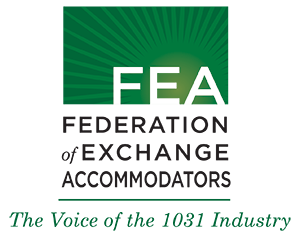Robison Law Firm
11353 REED HARTMAN HIGHWAY
SUITE 300
CINCINNATI
,
OH
45241
PHONE: 513-412-3483
FAX: 513-412-3482
News
Qualified Intermediaries Celebrate 25 Years of Section 1031 Like-Kind Exchange Compliance
Las Vegas, Nevada (September 15, 2016)-- The U.S. Treasury rules giving rise to the like-kind exchange “Qualified Intermediary" turn 25 this year. Established by Treasury safe harbor regulations in 1991, professional Qualified Intermediaries (QIs) promote compliance with the law and make the benefits of like-kind exchanges, also known as 1031 exchanges, accessible to business and property owners nationwide.
QIs act as independent third-party principals in 1031 exchange transactions. “QIs are equal parts facilitator, educator, and compliance officer," said Margo McDonnell, president of 1031 CORP., a Philadelphia-based Qualified Intermediary, and outgoing president of the Federation of Exchange Accommodators (FEA), the national 1031 exchange trade association for QIs. “Taxpayers benefit from the guidance Qualified Intermediaries provide. The strict requirement of Internal Revenue Code Section 1031 must be met for an exchange to be approved by the IRS. Without the guidance of Qualified Intermediaries, investors would see many more like-kind exchanges disqualified, negatively affecting business reinvestment and job growth. This would also increase the risk of abuse," said McDonnell, speaking from the FEA 2016 Annual Conference in Las Vegas on September 14, 2016.
FEA member Qualified Intermediaries help taxpayers of all sizes efficiently redeploy capital across the country, leading to job creating spending in local communities. Professional QIs simplify the exchange transaction for all parties, including the asset owners seeking 1031 tax deferral as well as their tax/legal advisors, the closing officer preparing the closing statements, and real estate professionals assisting the taxpayer. “Investors often need input to understand the strict rules of identification and other procedural issues," said McDonnell, “QIs are integral to the efficiency of the process."
Encouraging active and ongoing reinvestment in property were central to Congress' original intent for enacting the tax deferral status of IRC Section 1031 in 1921. Under the rules, a taxpayer completing an exchange cannot have receipt of the funds from a sale without creating a taxable event. Professional QIs ensure that the sale proceeds are properly restricted. Any funds unused for reinvestment are returned to the taxpayer at termination of the exchange and this portion is then taxable.
The rise of the professional QI in the last 25 years has given small investors valuable assistance in complying with IRC 1031s provisions, while providing a check on exuberant investors trying to abuse the tax code. While larger assets are routinely exchanged, a 2011 survey of members of the Federation of Exchange Accommodators found that more than a third of exchange transactions were below $500,000. “Through Section 1031, many asset owners are exchanging to build or preserve their life savings. We see a significant amount of middle class taxpayers exchanging single family rental homes, farmland, and construction equipment. There's no doubt that Section 1031 promotes investment in small to medium sized businesses. Most QIs are small businesses, themselves," said Steve Chacon, incoming president of the FEA and a vice president at Accruit, a national QI firm based in Denver. Typical fees for a Qualified Intermediary's services are between $750 and $1500 per exchange.
California and Colorado see the highest number of exchange transactions each year, but the use of 1031 exchanges is widespread across the country. QIs facilitate exchanges nationally in many industries, including both residential investment real estate and commercial real estate, construction, the vehicle/equipment rental and leasing industries, transportation, agriculture, farming and ranching and other industries.


